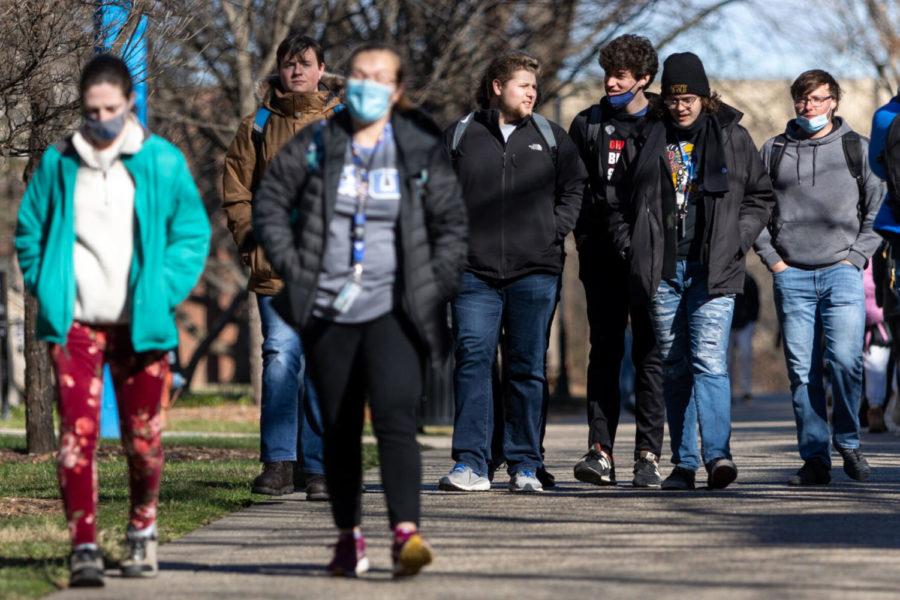UK resumes in-person classes as omicron cases rise
Students walk across campus on the first day of the spring semester on Monday, Jan. 10, 2022, at the University of Kentucky in Lexington, Kentucky. Photo by Jack Weaver | Staff
January 13, 2022
The new year brings new challenges for UK, and the omicron COVID-19 variant has become one of the most relevant. The university has implemented further actions to prevent the spread across campus.
UK has purchased two KN95 masks for each individual coming to the main campus and is in the process of purchasing more, according to a campus-wide email from president Eli Capilouto on Jan. 7.
These masks are being handed out at wellness huts, in dorms during move-ins and in other various locations on campus.
During Jewell Hall move-in, KN95 masks were found piled up on elevator floors and miscellaneous hallways just two days into the new semester, residential advisor Aza Appelman said.
Jewell Hall residential advisors have to ask many of their residents to put on a mask when going through the lobby and hallways where many often pull them out of their pocket after being told to do so, Appelman said.
“A good majority follow the mask policy with little complaining, but many blatantly refuse to wear their masks, or they put them on when authoritative figures are around only to rip them off when they get into an elevator or onto a different floor,” Appelman said.
Alongside enforcing the mask mandate, the university is recommending students be vaccinated, receive the booster shot as well as the flu shot and to be “constantly” tested if not vaccinated, according to UK spokesperson Jay Blanton.
“Now, we’re really going to push for boosters because we know those are particularly effective against this current strain omicron, which appears to be much more highly transmissible but also appears to be less severe,” Blanton said.
UK will implement a booster incentive program around Feb. 1 similar to the earlier one for COVID-19 vaccinations but with cash prizes, Blanton said.
“I think booster incentives are great,” UK sophomore Ella Zombolo said. “As a person who wasn’t going to get the booster, it does lean me into the ways of getting it for all of the great prizes that are available.”
Also wary about receiving their booster, Appelman is planning on getting theirs later into the semester due to the incentive program and overall concern for others’ health and safety.
UK sophomore Thomas Francisco received his booster upon his arrival for the spring semester due to the many people he knows who have tested positive, but he also had other ideas to minimize the spread.
“I feel like a week or two of semi-isolation and online classes could be a slightly better response on the university’s part, but I’m really pretty indifferent about it because isolation means my mental health will likely take a hit,” Francisco said.
Appelman also expresses similar opinions with the ideas of an initial delay and isolation.
“I think delaying in-person classes by two weeks would be extremely beneficial,” Appelman said. “Going ahead and starting back in-person when we don’t absolutely have to seem unjustified.”
Nonetheless, relying heavily on vaccination rates, Capilouto is pushing forward with in-person education and as much normalcy as possible.
Most recent numbers show that the UK community is 90.8% vaccinated — students at 87.8% and faculty at 96.7% — according to the email.
Capilouto’s email also said “we [university staff and faculty] are here to educate students” and acknowledged that students perform better academically and socially when on campus and in-person.
“I am definitely a little scared [and] concerned to go back to in-person classes right now with what’s going on, but I’m also a little relieved,” Francisco said. “I don’t think I can mentally handle the isolation that would come from moving all classes online.”
Blanton said mental health issues such as those from students who are feeling isolated and disconnected are trying to be prevented and helped
“I would definitely rather be at school and in-person for mental health reasons, but only if it’s safe,” Appelman said. “For me personally, even being allowed to stay on campus but have online classes sounds nicer than just being sent home.”
Zombolo also said she’s ready to be back and attend her new classes where she can see her fellow friends across campus in midst of the pandemic.
“I think UK is taking the right procedures in order to have the university be in-person,” Zombolo said. “They care about their students and their education, and it shows that they do by having us come back to campus.”




















































































































































